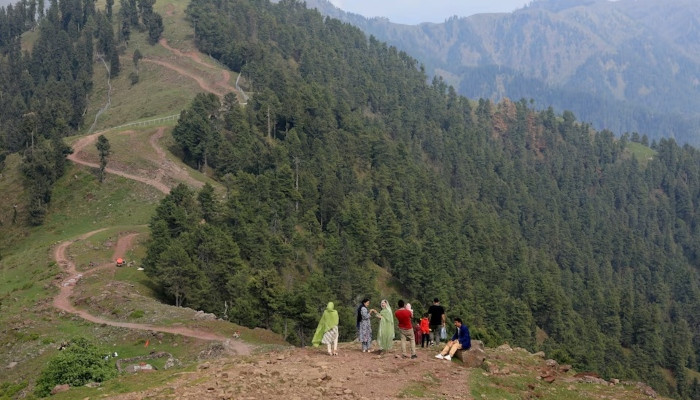Tourism Plummets in Kashmir Amidst Heightened Tensions
SRINAGAR, PIR CHINASI: Following a devastating incident last month, hotels and houseboats in Indian Illegally Occupied Jammu and Kashmir (IIOJK) are now providing discounts reaching up to 70% as tourists have departed. In Azad Jammu and Kashmir (AJK), a well-known tourist destination near the border has been shut down amidst rising tensions between opposing forces.
The disputed Himalayan area, celebrated for its stunning snow-capped mountains, swift rivers, and exquisite Mughal-era gardens, depends significantly on tourism. However, this vital industry is suffering due to the escalating hostilities between Pakistan and India.
The two nuclear-capable countries have engaged in multiple conflicts over this contested region. Clashes between military forces stationed along the Line of Control (LoC) have positioned the area as the primary point of contention.
However, a notable decrease in militant actions and a generally upheld ceasefire over four years had spurred a surge in tourism. This resulted in over 1.5 million tourists visiting AJK last year, while almost 3 million traveled to IIOJK.
This increase was promoted as a major accomplishment for the government. However, the revocation of IIOJK’s autonomous status in 2019 by Indian Prime Minister Narendra Modi’s administration instigated significant unrest.
At the start of this year’s peak summer season, hotels, houseboats, and taxis were almost fully reserved. However, everything changed after the April 22 incident where 26 individuals were killed in a meadow.
New Delhi has accused Islamabad of involvement, announcing retaliatory diplomatic and economic actions. Pakistan has firmly refuted these accusations, revealing equivalent measures, and cautioning against an imminent military assault by India.
In Pir Chinasi, situated at an elevation of 9,500 feet, roadside dining establishments, lodging, and hotels are only sparsely occupied. This is because authorities have encouraged caution due to concerns of a potential Indian strike, despite its relative distance from the Line of Control (LoC).
Authorities have stated that Neelum Valley, a border region and highly favored tourist spot in Pakistan, is currently inaccessible. Abrar Ahmad Butt, representative of the local lodging association, noted that all 370 hotels and guesthouses in the valley are presently vacant. Typically, tourists begin to flock to the area in May as temperatures rise in other parts of the country.
“This season is going to be seriously affected,” he commented.
Approximately 16,000 individuals in the area are employed in the tourism sector.
For Syed Yasir Ali, employed at an international mission in Islamabad, the inability to visit Neelum Valley was disappointing, yet he felt secure touring Pir Chinasi alongside his wife and children.
“This location is safe,” he asserted, suggesting that others are needlessly afraid of visiting. “I am here, and it is secure.”
However, this apprehension is creating tangible economic effects for local businesses like Musaddiq Hussain’s tuck shop.
“Business has drastically declined,” he lamented. “We need peace in the country to prosper. We hope that both countries can achieve peace.”
In Srinagar, the primary city in IIOJK, taxi operator Tanveer bemoans the missed opportunities.
“Before the tragic incident, the streets were crowded, and it was difficult to navigate the city,” he recalled, using only one name. “Now, I wait all day for a passenger. Before the incident, I was constantly busy.”
Yaseen Tuman, who manages a century-old travel firm and numerous houseboats in Srinagar, reported that nearly all reservations have been cancelled, leaving his houseboats empty.
“Our houseboats were completely booked, and now we have no visitors,” Tuman stated, seated on a wooden couch in a houseboat on Nigeen Lake.
While Indian travel booking platforms display substantial discounts for houseboats and hotels, Tuman stated he would not lower rates, as he does not anticipate a significant tourist influx. “We need to brace for a prolonged slowdown.”



Comments (0)
No comments yet. Be the first to comment!
Leave a Comment